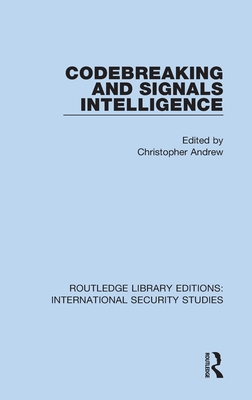

 Routledge
Routledge
Codebreaking and Signals Intelligence


Key Metrics
- Christopher Andrew
- Routledge
- Hardcover
- 9780367708757
- -
- -
- History > Military - General
- English
 Secure Transaction
Secure TransactionBook Description
Despite publicity given to the successes of British and American codebreakers during the Second World War, the study of signals intelligence is still complicated by governmental secrecy over even the most elderly peacetime sigint. This book, first published in 1986, lifts the veil on some of these historical secrets. Christopher Andrew and Keith Neilson cast new light on how Tsarist codebreakers penetrated British code and cypher systems. John Chapman's study of German military codebreaking represents a major advance in our understanding of cryptanalysis during the Weimar Republic. The history of the Government Code and Cypher School - forerunner of today's GCHQ - by its operational head, the late A.G. Denniston, provides both a general assessment of the achievements of British cryptanalysis between the wars and a tantalising glimpse of what historians may one day find in GCHQ's forbidden archives. The distinguished cryptanalyst of Bletchley Park, the late Gordon Welchman, describes in detail how the Ultra programme defeated the German Enigma machine, while another Bletchley Park cryptographer, Christopher Morris, reminds us in his account of the valuable work on hand cyphers that wartime sigint consisted of much more than Ultra. Roger Austin's study of surveillance under the Vichy regime shows the continuing importance of older and simpler methods of message interception such as letter-opening. Taken together, the articles establish sigint as an essential field of study for both the modern historian and the political scientist.
Author Bio
Professor Christopher Andrew is a Professor of Modern and Contemporary History at the University, teaching European history and international relations since the French Revolution. His research interests are Twentieth-century political history and international relations with particular reference to the role and influence of intelligence agencies.
Professor Andrew rose to prominence with his books on the KGB, most notably KGB: The Inside Story of its Foreign Operations from Lenin to Gorbachev (1990) and The Mitrokhin Archive. Vol.1: The KGB in Europe and the West (1999), written in collaboration with former KGB officers Oleg Gordievsky and Vasili Mitrokhin respectively.
Owning to his expertise in the history of security and intelligence agencies, Professor Andrew was commissioned by the Security Service (MI5) to write the first authorized history of the Service, to mark its centenary in 2009.
To conduct his research for the book, Professor Andrew was given exclusive access to the Service's records and files. Defense of the Realm (2009) was very well received.
Professor Andrew is the Former Chairman of the Faculty of History, and in December 2010 he stepped down as President of Corpus Christi College.
Source: University of Cambridge
Videos
No Videos
Community reviews
Write a ReviewNo Community reviews